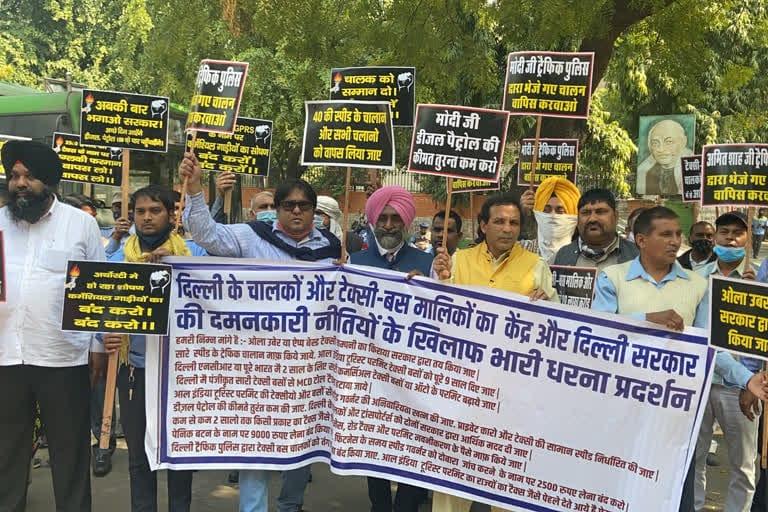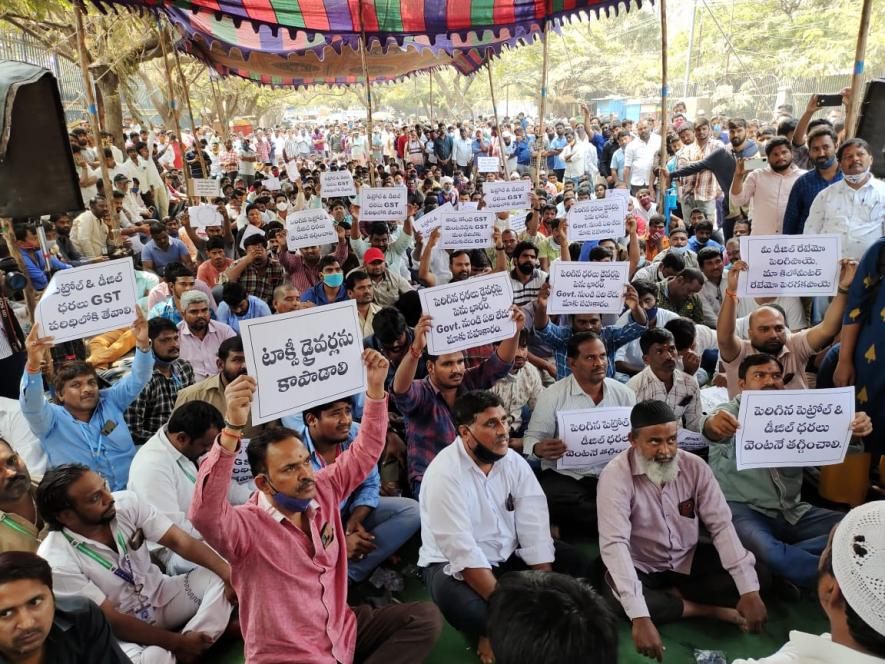Fuel Price Rise: ‘Govt. Unbothered by Crisis Ridden Transport Sector’

Hyderabad: “The entire road transport sector is in severe crisis or on the verge of collapse in the country,” says R. Lakshmaiah, deputy general secretary of All India Road Transport Workers Federation, on the continuous hikes in petrol and diesel prices – which increased for a twelfth consecutive day on Saturday. Both Telugu-speaking states have been witnessing spontaneous protests from common people across districts condemning the hikes while workers’ bodies are also holding massive demonstrations.
Over the last ten days, the price of petrol in Telangana’s Hyderabad has increased from Rs 91.09 per litre to Rs 94.18 per litre; the diesel price rose from Rs 84.79 per litre to Rs 88.31 per litre, mimicking a trend seen across the country.
“During the pandemic the Central Government increased excise duty by Rs 13 per litre on petrol and by Rs 16 per litre on diesel. The Government of India is generating revenue at the cost of the lives of crores of people. While transportation charges will definitely rise due to the price rise there will also be a steep rise of prices of commodities which will end up burdening the common people,” said Lakshmaiah. He added that the transport workers’ unions have been demanding that the government restores the duties and taxes on fuel to the same level as March 1, 2020
He added that the government appeared to be least bothered about the increasing crisis in the transportation sector.
For the last few days, Uber and Ola drivers and other App-based transportation workers have been staging numerous protests across Hyderabad, Delhi, Bengaluru and Chennai, demanding that the government stop the rise and bring petrol and diesel under Goods and Services Tax (GST).

“Nearly 60% of drivers in the city had gone back home during the lockdown. With the rising cost of diesel barely 40% of the cabs are currently on the road,” said Shaik Salauddin, National General Secretary, Indian Federation Of App Based Transport Workers (IFAT). Salauddin, based in Hyderabad, said that thousands of transport workers were on dharnas as they were “annoyed” by the continuous increase in fuel prices.
IFAT representatives – J. Mathews from Chennai, Kamaljit Gill from Delhi and Somashekar from Bengaluru – have demanded that the government regulate the commission being charged by cab aggregatorsUber and Ola.
“Currently, Uber and Ola companies charge commission up to 30-35% per ride from drivers. Low fare rules and high commission charged by the companies has been impacting the net income of the drivers. While both cab aggregators resumed full services earlier this month, there is hardly any business for drivers with most of them getting an average of two to three rides per day (sic),” IFAT said in a press release.
On November 27, 2020, the Ministry of Road Transport and Highways issued the Motor Vehicle Aggregator Guidelines 2020 as per the requirements and provisions of the Motor Vehicles (Amendment) Act, 2019. It was intended to be a guiding framework for the states to regulate the business being conducted by the aggregators.
IFAT has written to the Union Government requesting schanges to the clauses in the guidelines and recommended that certain sections be struck off as they pose a threat to the safety of the riders and how much they make.
“The Motor Vehicle Guidelines integrates Social Security in the form of insurance (health and term) for the Drivers but fails to elaborate on how the workers will be able to access these schemes or whether the Government will monitor and audit the aggregators to ensure compliance and implementation,” said Salauddin. He added that the guidelines have not been inclusive in nature as well, as it excludes food and goods delivery workers and women drivers who are part of gig and platform work.
In Andhra Pradesh and Telangana, trade unions – CITU, AITUC and INTUC among others –have been organising protest demonstrations against the auto fuel price hikes. “People from the lower middle-class are bearing the burnt of the price hikes. The services sector is still reeling under a pandemic-induced crisis and the fuel prices are only amplifying it,” said M.A. Gafoor, general secretary of the Andhra Pradesh’s CITU unit.
Get the latest reports & analysis with people's perspective on Protests, movements & deep analytical videos, discussions of the current affairs in your Telegram app. Subscribe to NewsClick's Telegram channel & get Real-Time updates on stories, as they get published on our website.






















